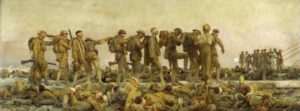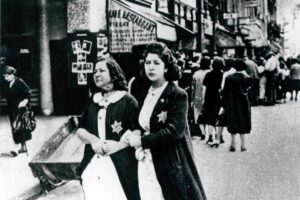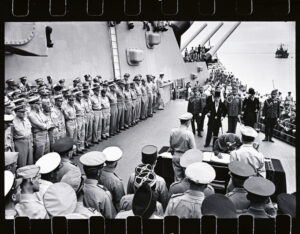LEST WE FORGET

Last Friday was December 7th, 2023. I wondered, on that day, what the newspaper and media headlines would say. How would they report about one of the greatest events in America history? What am I talking about? Ah, that’s the problem. You see, on December 7, 1941 the American naval fleet and it’s military installation in Hawaii was suddenly bombed by attacking Japanese naval forces in a sneak attack. The attack killed 2,403 U.S. personnel, including 68 civilians, and destroyed or damaged 19 U.S. Navy ships, including 8 battle ships. It also was the start of our involvement in World War Two.
Hitler’s invasion of Poland in September of 1939, caused Great Brittan and France to declare war on Germany due to agreements between those countries. That marked the begining of World War II in Europe. Only in June 1940, when France was about to fall and World War II seemed virtually over, did Italy join the war on Germany’s side, still hoping for territorial spoils. The Soviet Union joined WW2 on September 17, 1939, when it invaded eastern Poland in coordination with Nazi Germany. But, on June 22, 1941 Germany suddenly invaded Russia. That resulted in the U.S.-Soviet alliance of 1941–1945 and resulted in the cooperation that was essential to securing the defeat of Nazi Germany.
Japan had been involved in war in September of 1940 with the invasion of French Indochina. On September 27, 1940, Japan signed the Tripartite Pact with Germany and Italy, thus entering the military alliance known as the “Axis.” The Japanese attack on Pearl Harbor the following year was the catalyst for the United States’ entrance into the war.
Over the next six years, the conflict took more lives and destroyed more land and property around the globe than any previous war. World War II was the deadliest military conflict in history. An estimated total of 70–85 million people perished, or about 3% of the 2.3 billion (est.) people that comprised the global population in 1940.  By the end of World War II, much of Europe and Asia, and parts of Africa, lay in ruins. Combat and bombing had flattened cities and towns, destroyed bridges and railroads, and scorched the countryside. The war had also taken a staggering toll in both military and civilian lives. Germany, Italy, and Japan were conquered and occupied. The Soviet Union lost its most productive citizens—more than twenty million died in the war. The war also involved Nazi Germany’s deliberate, organized, and machine like murder of approximately six million European Jews and at least five million Soviet prisoners of war, Romany, Jehovah’s Witnesses, homosexuals, and other victims.
By the end of World War II, much of Europe and Asia, and parts of Africa, lay in ruins. Combat and bombing had flattened cities and towns, destroyed bridges and railroads, and scorched the countryside. The war had also taken a staggering toll in both military and civilian lives. Germany, Italy, and Japan were conquered and occupied. The Soviet Union lost its most productive citizens—more than twenty million died in the war. The war also involved Nazi Germany’s deliberate, organized, and machine like murder of approximately six million European Jews and at least five million Soviet prisoners of war, Romany, Jehovah’s Witnesses, homosexuals, and other victims.
The war had been raging for almost five years when U.S. and Allied forces landed on the beaches of Normandy, France, on June 6, 1944. The war in Europe with Germany and Italy ended on May 8, 1945 – known as Victory in Europe Day or V-E Day – celebrations erupted around the world to mark the end of World War II in Europe. The war in the Pacific with Japan continued however. After six years of fighting, President Harry Truman had to make one of the most controversial decisions in history: whether or not to drop the atomic bomb on Hiroshima and Nagasaki. On August 6, 1945, the United States dropped an atomic bomb on the city of Hiroshima. The bomb was known as “Little Boy”, a uranium gun-type bomb that exploded with about thirteen kilotons of force. at the time of the bombing, Hiroshima was home to 280,000-290,000 civilians as well as 43,000 soldiers. Between 90,000 and 166,000 people are believed to have died from the bomb in the four-month period after the explosion. A slightly larger
plutonium bomb named “Fat Man” exploded over Nagasaki three days later levelled 6.7 sq km. of the city and killed 74,000 people by the end of 1945. Ground temperatures reached 4,000°C and radioactive rain poured down. The official end of the war with Japan was September 2, 1945, V-J Day, the day the Japanese signed the official surrender aboard the USS Missouri. But August 14 would continue to be celebrated around the world as the day the news spread throughout the world that war had finally come to an end. The First World War was fought from 1914 to 1918 and the Second World War was fought from 1939 to 1945. It ended September 2, 1945. Both were the largest military conflicts in human history. But, World War II involved combatants from most of the world’s nations and is considered the deadliest war in history.
I was six years old when Japan attacked Pearl Harbor. I remember that day as clearly as if it were happening today. We had moved from our big home on 9th Street in Anacortes and rented it to the head of the local pulp mill. We rented it because my parents we were not able to make the mortgage payments and had us moved to a smaller house. It was located directly across the street from Causland Park in Anacortes between 7th and 8th Streets. St. Mary’s Catholic Church was directly across the corner the street. The family grocery store was on Commerical Street not far from the house The park was my playground. It was a sunny morning on Sunday on December 7th and I was playing outside in the back yard when people were suddenly were talking loudly and shouting to each other. It seemed to me like every radio in the neighborhood was turned up loud. Everyone was in shock. People were outside talking to each other. From that day, life changed for everyone until the war was over. We had rationing of everything including gas, clothing and food. People used rationing stamp books to shop. Shortages were common. Dad painted out the words “Italian foods” on the store sign. Children were involved in collecting scrap iron for the war. People listened to the radio for news of the war and newspaper daily reported on it as well. Communities conducted scrap metal drives and planted “victory gardens. The war dominated our world in movies, community activities and every aspect of our daily lives.
President Roosevelt said in speech to Congress, declaring war on Japan, that December 7th was “a day that would live in infamy.” Now, eighty two years later, our nation seems to have passed it by as a minor news item in reporting by the newspapers and media. Small articles on the back pages about the significance of that date and a thirty second TV mention was the most attention paid. But, Winston Churchill was right when he said about WW II “Never in the field of human conflict was so much owed by so many to so few.”
“The tumult and shouting dies. The captains and the kings depart. Still stands thine ancient sacrifice. An humble and contrite heart. Lord God of Hosts, be with us yet, lest we forget lest we forget.” Rudyard Kipling.
